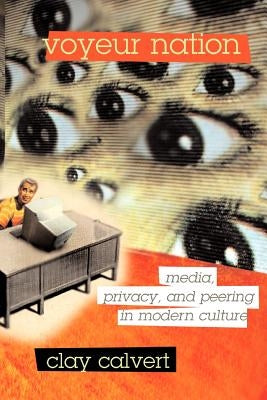1
/
of
1
Basic Books
Voyeur Nation: Media, Privacy, and Peering in Modern Culture
Voyeur Nation: Media, Privacy, and Peering in Modern Culture
Regular price
€17,95 EUR
Regular price
Sale price
€17,95 EUR
Shipping calculated at checkout.
Quantity
Couldn't load pickup availability
From 24-hour-a-day "girl cam" sites on the World Wide Web to trash-talk television shows like "Jerry Springer" and reality television programs like "Cops," we've become a world of voyeurs. We like to watch others as their intimate moments, private facts, secrets, and dirty laundry are revealed. Voyeur Nation traces the evolution and forces driving what the author calls the 'voyeurism value.' Calvert argues that although spectatorship and sensationalism are far from new phenomena, today a confluence of factors-legal, social, political, and technological-pushes voyeurism to the forefront of our image-based world.The First Amendment increasingly is called on to safeguard our right, via new technologies and recording devices, to peer into the innermost details of others' lives without fear of legal repercussion. But Calvert argues that the voyeurism value contradicts the value of discourse in democracy and First Amendment theory, since voyeurism by its very nature involves merely watching without interacting or participating. It privileges watching and viewing media images over participating and interacting in democracy.
Author: Clay Calvert
Publisher: Basic Books
Published: 05/01/2004
Pages: 274
Binding Type: Paperback
Weight: 0.92lbs
Size: 9.10h x 5.97w x 0.75d
ISBN: 9780813342368
Author: Clay Calvert
Publisher: Basic Books
Published: 05/01/2004
Pages: 274
Binding Type: Paperback
Weight: 0.92lbs
Size: 9.10h x 5.97w x 0.75d
ISBN: 9780813342368
About the Author
Clay Calvert is an assistant professor of communications and law and co-director of the Pennsylvania Center for the First Amendment at Pennsylvania State University. He has published over twenty law journal articles in the past four years on First Amendment issues affecting the media, journalism, and advertising. He has a Juris Doctor from the University of the Pacific and a Ph.D. in Communication from Stanford University. He lives in State College, Pennsylvania.
Share


